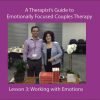Having good boundaries in a relationship is immensely important. Whenever boundaries are either too strict or too loose the relationship suffers...
If boundaries are too loose they can become an existential threat to the relationship: A relationship can only exist when clear boundaries are drawn around a couple and the sanctity of the relationship is honored and respected.
If boundaries are too strict, on the other hand, they can stifle natural human needs and instincts and can make you feel like you can’t really be yourself.
Finding the right balance where you can both be yourself and be respectful of your partner can be tricky, but in this article we will try to look at some simple rules that can guide you in the right direction…
What Does it Mean to Have Healthy Boundaries?
When partners have good boundaries in how they govern themselves they often also don’t have the need to control each other or make rules about how the other person should behave. Boundaries will then neither be to loose nor too strict, and both partners can then feel safe as well as free.
When you trust that your partner will maintain good boundaries in relation to the outside world it becomes safer to be in a relationship with them. The need to control them therefore becomes less of an impulse.
The ability to extend trust and grace to your partner so they can be themselves and govern themselves tends to increase your partner’s feeling of being loved. This in turn increases their commitment and love for YOU.
When this give and take of mutual respect is out of balance, however, it can lead to many problems…
When Do Boundaries Become Problematic?
If I can’t trust my partner because of their loose boundaries and I try to manage my anxiety about them by setting strict rules for who they can talk to and how they can govern themselves, the relationship might end up becoming stifling to my partner who feels like they can no longer be themselves. This in turn, might lead my partner to keep secrets from me, or crave time away from me where they can more fully be themselves. In other words, trying to control the other person doesn’t really work and might reach the level where the relationship ends up feeling like a prison rather than a place to grow and be your fullest self. By trying to keep the other safely yours by making rules about how they can behave, you instead end up pushing them away and making them feel they can’t openly be themselves.
4 Simple Boundary Principles to Live By:
To avoid getting into such a negative pattern of control and deceit, both partners need to demonstrate to each other that they can govern themselves appropriately as free people who are in a committed relationship.
Below are 4 principles I believe are immensely important to maintain good boundaries in a relationship. If these principles are followed there is a great likelihood that couples can find a way to feel safe with each other without squashing each other’s freedom, growth, and healthy need for a social life outside of their relationship.
1. Boundaries need to be transparently discussed:
One of the most essential rules of any relationship is that boundaries need to be defined and agreed on in an open and transparent way that balances both the comfort level of your partner and your need for freedom. Depending on how you define your relationship you may be open to allowing yourself and your partner to date other people, to flirt with others, or to maintain close relationships with exes, but these kinds of rules would need to be agreed on. If you are wanting a less open relationship and want to draw tighter boundaries than that you would need to have that discussion as well and strike a balance that you can both feel comfortable with. There really aren’t any set rules you need to play by other than the ones you both agree to. However, once you have an agreement it is important to be true to your word and honor those commitments, otherwise you will damage the trust between you, and without trust there cannot be a healthy committed relationship.
2. Partners need to play by the same rules:
Whatever liberties you would like to have to interact freely with other people should also extend to your partner. Sometimes partners want to have it both ways: They want to be able to instant message their exes, but also be able to tell their partner not to do so. Such kinds of double standards are obviously neither fair nor reasonable. If something about how your partner is interacting with other people is making you uncomfortable, whatever new boundary you agree on should obviously apply to both of you.
3. You should set boundaries in relation to people who don’t respect the boundaries of your relationship:
A condition for maintaining and cultivating relationships outside of your romantic partnership should always be that these other people respect the fact that you are already in a committed relationship. If you are interacting with a friend and this friend all of a sudden makes a romantic advance or suggestion, a clear boundary should be drawn. A friend like that is not really a friend and it will be up to you to hold that boundary and show good judgment in who you interact with.
4. Boundaries should be self-imposed not dictated by others:
Boundaries that are imposed by others don’t work. They might elicit outward compliance, but if they don’t seem fair or reasonable to the person you are with, they might just placate you and do what they want when you are not around. You should want to protect your relationship of your own volition. If your partner requests that you sacrifice friendships to lessen their own anxiety, or asks you to make other sacrifices that limits you in ways that denies your healthy human needs, you should think twice about it. If you are already demonstrating that you can uphold the sanctity of your commitment to your partner by drawing appropriate boundaries when needed, and if you are comfortable if your partner plays by the same rules as you do, there should not be an issue with having friends and engaging in social activities outside your relationship. Compromising on basic healthy human needs can turn your relationship into a prison rather than a greenhouse that allows you to grow and be your best self. Love does not restrict and confine to manage one’s own anxiety – it wants the other person to be their best and most fulfilled self.
Additional Resources:
For more information about boundary setting and healthy boundaries, here are some other articles from the web:
- Setting Boundaries Efficiently
- How to Set Healthy Boundaries in Close Relationships
- How to Set Boundaries in Your Relationships
I also recommend my previous article:


























